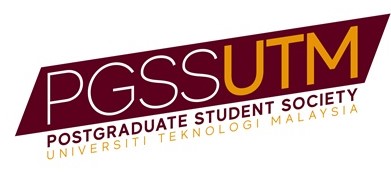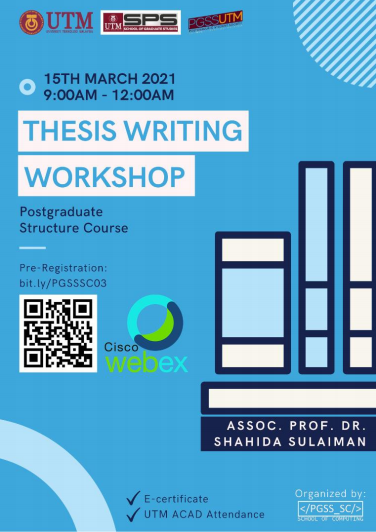Thesis Writing Workshop
On March 15th 2021, an online structured course entitled “Thesis writing Workshop” was organized to share the knowledge and strategies on how to effectively plan for thesis writing to achieve the goal to Graduate on Time (GOT). The structured course started at 9.00 am and ended at 12.00 pm using Cisco Webex online conferencing platform.
This course was organized by the Postgraduate Student Society School of Computing (PGSS-SC), with Muhammad Luqman Mohd Shafie as the moderator. This session was successfully held with the PGSS-SC committee’s help Muhammad Zafran Muhammad Zaly Shah, Asraful Syifaa’ Ahmad, and Muhamad Farhin Harun.
This course received 758 online registrations, and 400 participants turned up for the event. However, out of 758, 393 participants registered during the structured course. There are 54.19% PhD students, 29.77% Master degree students 1.27% Bachelor students, and the rest are unidentified. We also received participation from UTM staff. Additionally, 85.23% are from UTM, and the rest is non-UTM.
The honourable speaker is Associate Professor Dr. Shahida Sulaiman. Dr. Shahida is an associate professor in the Department of Software Engineering at School of Computing, Faculty of Engineering, Universiti Teknologi Malaysia, Malaysia. Formerly, she had served at Universiti Sains Malaysia (USM) for seven years. She holds a PhD degree in Computer Science and M.Sc. degree in Computer Science – Real-Time Software Engineering. Her research interests include software design and architecture, software visualization and evolution, and knowledge management. She also has a good linkage with the community and software industry that made her receive the Community Service Award (Academic Staff Category) and the Industry Involvement Award of Citra Karisma, UTM for 2013 and 2015, respectively. Dr. Shahida as the organizing chair of the Asia-Pacific Software Engineering Conference (ASPEC 2019). Recently, she had donated to the School of Computing Endowment Charity.
The sharing starts with the overview on general research methodology which consists of a few steps. Each step is related to specific chapters in the thesis. The speaker also regularly reminds the participant that the slide used is based on the School of Computing standard. Hence, the participants from other research fields should consult with their Academic Office to avoid confusion. Next is the information sharing on research skills that students should have to become fruitful researchers and effective writers. The speaker also shared strategy with the student on how to GOT, where thesis writing is the primary work among the others. For the thesis itself, our speaker shared the general structure of the thesis, which made of several chapters as follows:
Chapter 1: Introduction
Chapter 2: Literature Review
Chapter 3: Research Methodology
Chapter 4: Proposed Work
Chapter 5: Evaluation/Analysis and Finding/ Results and Discussion
Chapter 6: Conclusion
Each chapter has its timeline alongside the GOT duration. Next is the sharing of a detailed subchapter for Chapter 1. Chapter 1 is focussed on how to formulate the overall research introduction and to write the problem background. Several requirements need to be carried out at the early stage of writing, such as understanding the thesis format, deciding on reference format to use, deciding on proof-reader, understanding the concept of plagiarism, and deciding language to use. The rest of the first session focuses on how to write subchapter for Chapter 1 before the speaker goes for a short break. It covered how to introduce the research field, critic, current work to highlight the research gap and strategy on how to write several chapters more efficiently. The speaker conducts a short questions and answers (Q&A) session with the participants during the short break.
The second session continues with detailed sharing on how to write Chapter 2, which is the literature review. Similar to Chapter 1, there are also several strategies introduced to write an effective literature review. However, because the literature review includes several works from other researchers, citation strategy is also emphasized. There are also shared on several writing ethics that must be avoided during the thesis writing process. Next is the sharing on how to write Chapter 3, which is commonly referred to as research methodology, to highlight the research design and overall research flow. Besides that, the sharing also emphasized the importance of the evaluation process and how doing research evaluation correctly. Chapter 4 focuses on introducing the proposed works, and Chapter 5 summarizes the finding of the research. The final parts of the talk are discussing how to write thesis titles and how to write a holistic abstract. As the sharing session ended, the speaker engaged in a Q&A session with the participant.
The program ended with a photograph session together with participants and the speakers. Some issues came during the program. Firstly, the sound of notification when the participant enters or exit is disturbing the speaker, and it takes some time to reach the WebEx host, which is SPSS, to turn off the sound. Secondly, there is some confusion among participants on time for registration link sharing because participants are around the globe which are in different time zones. In future, the committee will include a time zone for any information related to this matter. Nevertheless, the participants appreciate all the efforts by the SPS UTM and PGSS SC as the organizers. Additionally, 96.69% participants rate this structured course 4 and 5 stars in terms of the overall rating. This course outcome is a kick start for PGSS SC to organize more workshops like this.






